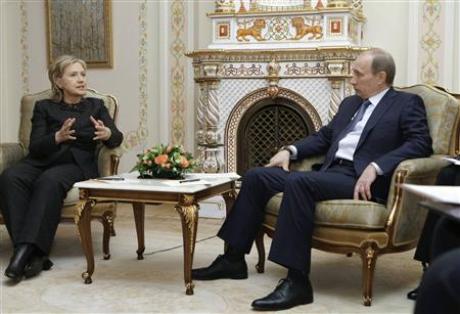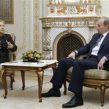
Putin Outlines Critical Issues in US-Russian Relations
Publication: Eurasia Daily Monitor Volume: 7 Issue: 58
By:

During last week’s visit to Moscow by US Secretary of State, Hillary Clinton, it was announced that the text of the START follow-on nuclear arms reduction treaty has almost been finalized. Apparently, all the contentious issues have been resolved. Foreign Minister, Sergei Lavrov, stated that on Moscow’s insistence a formula was found to include a clause in the treaty stipulating the “connection between ballistic missile defense (BMD) and offensive nuclear weapons.” According to informed sources, the new treaty will be signed by presidents Barack Obama and Dmitry Medvedev in a European capital before April 12. An international nuclear security summit is scheduled to begin in Washington on April 12, and the signing of a new nuclear disarmament treaty just before the event could be a welcome public relations coup for both Obama and Medvedev (Kommersant, March 20).
Lavrov announced, during a joint press conference with Clinton in Moscow, that the “reset” in relations with the US “has been a success” and compared Clinton’s visit to Moscow with a “mid air refueling” that has boosted relations. Lavrov quoted Medvedev, who told Clinton: “US-Russian relations are honest and open with agreements honored” (Interfax, March 19). Lavrov’s upbeat assessment of current US-Russian relations is in stark contrast with the opinions expressed by others. An influential Kremlin adviser on US-Russian relations, the Director of the Institute of USA and Canada Studies, Sergei Rogov, published an article claiming that Clinton’s visit to Moscow was a last ditch effort to save the bilateral relationship from a serious crisis. According to Rogov, after the announcement of the “reset” last year, “only the tone of statements became less hostile, but essentially that was all” (Nezavisimaya Gazeta, March 22).
Initially, the START follow-on treaty seemed an easy matter, since both Russia and the US are already in the process of decreasing their nuclear arsenals –Russia because it is struggling to produce replacements for its aging missiles, submarines and bombers, while the US does not see the need to spend vast sums conducting a pointless unilateral nuclear arms race. The new treaty was considered a vehicle to an overall improvement in relations and promoting essential cooperation on more sensitive issues such as Iran and Afghanistan. According to Rogov, if the new treaty is not signed soon and ratified before a new Congress convenes next January following the midterm elections in November, the treaty may be derailed by Republican Senators and US-Russian relations will plummet as a consequence. The new treaty, instead of boosting overall cooperation, may become an additional problem.
In Moscow, Clinton met Russia’s true national leader Prime Minister, Vladimir Putin, and according to Putin’s foreign policy aide, Yuri Ushakov, the entire scope of US-Russian relations –trade, BMD, Iran, Russian accession to the World Trade Organization (WTO), Georgia and Ukraine– were “frankly” discussed. Ushakov said: “the need to convert words into deeds was stressed.” Putin holds the US responsible for not removing Russia permanently from the Jackson-Vanik amendment trade limitations. “Putin said plainly that Russian entry into the WTO directly depended on the political will of the US administration,” stated Ushakov. As for the Jackson-Vanik amendment, Putin noted that previous American administrations had promised to annul it. Clinton confirmed that aim: “We are still unaware how soon the amendment may be repealed,” Ushakov said (ITAR TASS, March 19).
Of course, last June Putin personally killed all hope of any speedy Russian WTO accession by announcing that it will only enter alongside Belarus and Kazakhstan after agreeing on a customs union with those two nations. This, in effect, means that negotiations must begin almost anew after 17 years of previous talks (Interfax, June 9, 2009). Since then, Moscow has announced that it may join WTO not as part of a customs union with Kazakhstan and Belarus, but “in close cohesion with them” (Interfax, August 18, 2009). The exact meaning of this statement is unclear, and since last June Russian WTO accession talks have been stalled. For Putin the customs union is the first step toward reintegrating the post-Soviet space into a new super state. This month, Putin’s First Deputy, Igor Shuvalov, announced Moscow’s intent to abandon using the Russian ruble to create a common currency with Kazakhstan and Belarus by 2012 (RIA Novosti, March 9). For Putin, the partial restoration of the Soviet (Russian) empire may be more important than WTO membership, but blaming Washington seems irrational, though it could be a useful ploy for domestic consumption.
Putin told Clinton during a “long discussion on BMD” that the US failed to follow up suggestions on BMD cooperation proposed by Moscow in 2007, and that this has created problems. Putin told Clinton that new UN Security Council sanctions against Iran are possible, but they may be counterproductive. According to Ushakov, Putin used “interesting and expletive” words, while informing Clinton of the Russian position on Georgia and Ukraine (RIA Novosti, March 19).
Putin views the cornerstone of relations with the US as Washington’s acceptance of the strategic drive to reintegrate the post-Soviet space under Moscow’s rule. If Washington tacitly agrees to the notion, by somehow pressing through WTO membership of the customs union of Belarus, Kazakhstan and Russia as a new super state, and Washington broadly accepts the Russian policy of dominating Georgia and Ukraine, as well as recognizing the new greater Russia as a geopolitical equal through close “BMD cooperation” –there could be real progress and partnership.
It seems that Putin spoke openly with Clinton about real Russian concerns that have little to do with the Iranian nuclear issue. The new START follow-on treaty per se also avoids this issue, compared with the fate of Georgia, Ukraine and the rest of the post-Soviet space. Putin, once again, identified Russia as primarily a regional power that sees the US as a main adversary, challenging its regional dominance. This stance has much in common with how the Iranian ruling class defines its own outlook: the US must not encroach.




